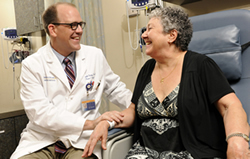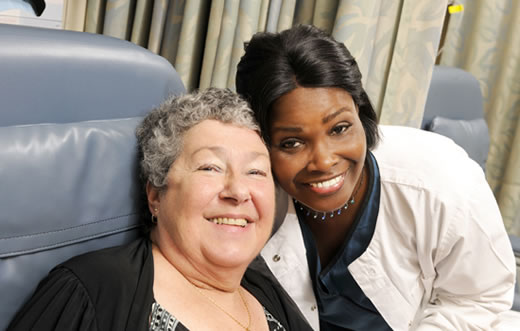Carolyn Higgins is cheery-eyed with a bright smile, a package of cheese and crackers in her hands. Nearby are two small chocolates still in wrappers. She looks as happy and relaxed as if she's lying on a chaise on a sunny beach.
"I'm sorry," she says sheepishly, referring to the food. "I forgot my lunch."
But on an adjacent chair, zipped plastic bags hold her belongings. An IV is inserted in her right arm, slowly delivering an experimental drug that she has been getting for three years into her vein.
That she has advanced multiple myeloma seems to bother Higgins not at all. She also seems unconcerned that the standard, FDA-approved drugs used to treat myeloma failed to work for her. Higgins is thrilled to be alive three years into a phase 1 clinical trial that tests the safety of a drug developed at the Winship Cancer Institute for multiple myeloma.
"I'm starting my fourth year," she says, sounding like a kid who's tricked her mother into letting her stay up way past bedtime. "This drug and I are best friends."
Higgins is one of almost 200 patients who participated in phase I clinical trials at Winship last year. Opened in 2009, the phase 1 unit is at the heart of the institute's drug development program. It is one of only two such units in Georgia and by far the largest and busiest, with 38 trials in 2011. Already, phase 1 research at Winship has led to four drugs in the FDA approval pipeline as well as another 24 drugs still under study. Among them, a drug developed by Higgins's oncologist, Sagar Lonial, is coming up for FDA review within a few months.
Just this year, two trials led by Suresh Ramalingam have moved into larger, multi-center phase 2 investigations that will test the efficacy of new agents to treat lung cancer. Both trials tested a combination of drugs, the first a combo of docetaxol and a newer agent known as STA9090. The second combined a PARP inhibitor (a drug that knocks out a cancer cell's repair mechanism) with chemotherapy.
And according to the New England Journal of Medicine, another Winship trial has shown promise against some solid tumors that have been difficult to treat in the past. Led by John Kauh, the study evaluates an antibody that blocks the protein PD-1. Earlier Emory Vaccine Director Rafi Ahmed had discovered that PD-1 acts as a brake on immune cells. In the current study, the antibody has allowed tumors to regress and stabilize in patients with advanced cancer (including non-small cell lung cancer, melanoma, and renal cell cancer).
Safety first
 | |
Donald Harvey, who directs Winship's clinical trials unit, reveres his patients, who he says are pioneers, helping unravel mysteries that may possibly extend their own lives as well as others. |
The phase 1 unit, tucked into a quiet but busy corner of Winship, occupies only 2,100 square feet, roughly the size of a family home. For many, it will become another sort of home—a place where a shared sense of purpose connects a disparate group of people and unites them against a common enemy, in this case, cancer.
These people also share common beliefs—not only does scientific research pay off but also life is made more meaningful by doing something for others.
Phase 1 trials are those in which drugs that have shown promise in laboratory studies are first administered to humans, alone or in combination with other drugs. Usually such a trial involves between 20 and 100 patients. Some of the drugs that are tested will go on to gain FDA approval, curing people of cancer or extending their lives for many years. The main purpose, however, of a phase 1 trial is to determine whether a drug is safe for use in humans, and if so, at what dose and over what time.
Although most of the patients in the phase I unit have an aggressive cancer that has failed to respond to standard treatments, hope remains palpable. Each patient brings to the unit his or her own private reasons for taking the bold step of letting doctors and nurses try a first-in-human treatment. Some speak of their grandchildren, wanting to live to see them graduate. Others talk about a brother or sister in whose memory they fight. All face possible unknown side effects, and many spend long days in the unit, dozing, watching TV, laughing with nurses—and always hoping.
"When we give a new drug, we want to know, did it get to the cancer cell? Did it get to the proteins we wanted? And how long did it stay in the body?" says R. Donald Harvey, director of the phase 1 unit. But patient safety remains the priority.
Rigorous standards apply to these trials, and oversight—both internal and external—is appropriately intense. Higgins says that she has been so closely monitored that she thinks of the unit as a VIP suite. "They don't just attend to you, they hover," she says.
Full Story >>
